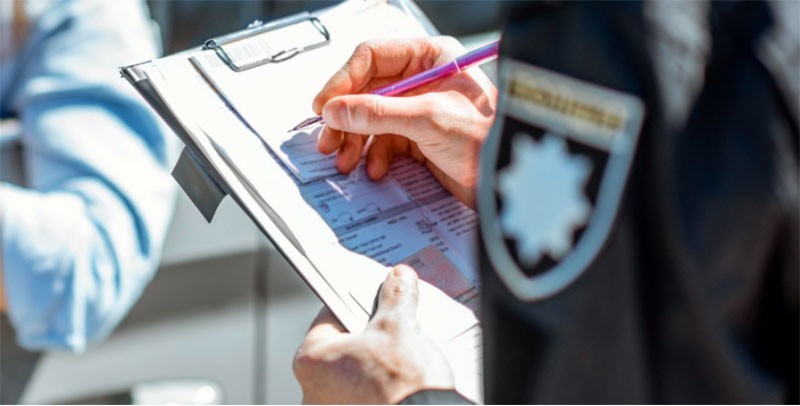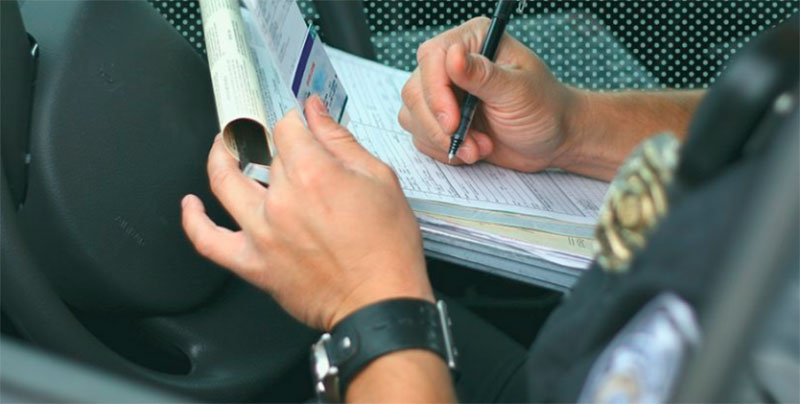There are situations in which a speed camera will alert the authorities and result in a ticket being issued. If you receive a ticket or citation, you will likely be required to pay a fee and may even have to appear in court or go to jail.
When you get a ticket for disobeying a traffic control device—like a stop sign or red light—because it's you've increased the risk of harm to other drivers on the road. The severity of the consequences depends on factors including where the incident occurred and who was at fault.
The penalty for driving under the influence (DUI) or driving while intoxicated (DWI) convictions are severe, ranging from a hefty fine to the loss of your driving privileges and even time spent behind bars. Your driving record will likely show this ticket for at least three years. However, depending on the state, you may have to pay significantly more for motor insurance for the next decade because of the point on your record.
Speeding Tickets

When you are discovered breaking the rules of the road, the police officer will issue you a traffic citation, often known as an auto citation or ticket. You will be compelled to pay a fine or appear in court on a specific date, and the notice will serve as documented proof of the offense.
We may discuss the most typical types of auto citations, such as speeding tickets, now that we've established that there is no distinction between the two. Every time a motorist exceeds the speed limit selected by law enforcement, they will be issued a speeding ticket. If the vehicle was parked at the time of the infraction, the penalty is not deemed a moving offense. Crimes resulting in a ticket while driving are known as "moving infractions." A few of the most often issued traffic citations are for:
You could be pulled over for a minor traffic infraction if you don't use your turn signals. As a result of this infraction, you may receive a citation, which could result in license points and monetary penalties. When a law enforcement officer pulls you over and issues a source, they will explain the alleged violation. The police may have used a hand-held speed gun to record your speed in the event of a speeding ticket.
The officer will give you a ticket after explaining why they think you broke the law. You are not admitting guilt by doing so, but you are committing to either pay the fine or appear in court to fight the ticket.
Declaration of Insurance

Don't freak out; it's standard procedure to ask for identification before allowing you to continue driving. Respond nicely to the officer's queries and explain your situation. There's a chance the policeman has evidence showing you were going too fast or committing another infraction, so disputing it might not be the most extraordinary move.
What should you do now?
There will be times when you have to show up in court. If you receive a speeding ticket, a reckless driving penalty, or are involved in an auto accident, you may have to appear in court. You must know precisely what to do after citing a source. A misdemeanor charge, a hefty fine, or even jail time may result from a failure to appear in court. You may have to fork over more money than originally planned (a penalty) to get that ticket taken care of.
Take down as much information as possible about the incident, including the time and date, the weather, your location, any obscured speed limit signs, and anything else you can think of. Try to do this after the citation, while the details are still fresh in your mind.
Have your citation issues resolved: For some, this may include going to court or forking out cash to settle a traffic fine. However, this may result in higher premiums for your car insurance. You can contest the citation in court if you believe the officer made a mistake.
Do I have any options for reducing my speeding fine?
Paying the fine may not damage your driving record, or you may be required to complete a defensive driving course before waiving the penalty. If you qualify, you may also be eligible for a reduced fine.
You have two options in court: challenge the ticket and try to prove your innocence, or plead your case and accept responsibility for the infraction, explaining why you think the key was miswritten and asking the judge to lower the points on your license or the fine.

What Is A Sinking Fund: A Comprehensive Guide

What Is Intermediate or Medium-Term Debt: A Comprehensive Guide 2023

The Enterprise Ethereum Alliance: What It Is, What You Can Do

Best Flood Insurance Companies

What are the Steel Stocks

How to Join a Group of Angel Investors

How to Lock Your Credit in Just Minutes - The Ultimate guide!

Revolving Credit vs. Installment Credit: An Overview

Minimum Monthly Payment Definition

What Do You Need To Know About Short Sales?

What Is the U.S. Dollar Index (USDX) and How to Trade It
